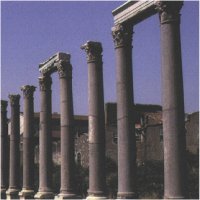A Journey to Revelation’s Seven Churches
Dr. Mark Finley and Dr. Michael Hasel take you on a journey from the Isle of Patmos to the seven church of Asia Minor: Ephesus, Smyrna, Pergamos, Thyatira, Sardis, Philadelphia, and Laodicea. Discover how archaeological discoveries reinforce the great themes written by John in the book of Revelation.
– Taught by Dr. Mark Finley and Dr. Michael G. Hasel
Revelation is especially designed by God to reveal His plans and to unmask the plans of Satan. Its prophetic images tell the story of the triumph of Christ over all the forces of evil. Despotic powers rise and fall, but Jesus is eternal. His plans succeed. In spite of opposition and persecution, Jesus and His people are victorious. Archaeology does not prove the Bible is inspired, but it does present evidence for seeking minds that confirms its authenticity. A Journey to Revelation’s Seven Churches is the fifth and final course in The Discoveries of a Lifetime series taught by Dr. Mark Finley and Dr. Michael G. Hasel.
In this study of Biblical Archaeology, you will:
- Discover how John referenced the characteristics of the physical location of the seven churches, in Revelation, in his letter to each one
- Learn vital spiritual lessons for today from the description of each of the seven churches
- Learn how the messages to the seven churches call us to a deeper commitment to purity, faithfulness and Jesus, who is triumphant over the forces of hell
- Receive the lecture and the notes from Dr. Finley and Dr. Hasel
What is Biblical Archaeology?
The name refers to a special focus of archaeology within a certain location at a certain point in time. The fact that it’s Biblical Archaeology means that excavations are typically limited to areas mentioned in the Bible; places such as modern-day Israel, Jordan, Syria, Turkey, Egypt, Iraq, Iran, etc. The time period includes, but is not limited to, 1,400 BCE (late Bronze Age) through the first century BCE. The aim of Biblical Archaeology is to find physical evidence that would shed light on people, places, events, and customs described in the Bible. (Reference: Ashley Echard, contributing writer for Christian Broadcasting Network)
Note: BCE (Before Common Era) and BC (Before Christ) mean the same thing.
Before completing the course, you will be required to take a brief quiz to test your understanding of the material presented.
View More...
Michael G. Hasel has taught Near Eastern studies, biblical studies, and archaeology at Southern since 1998. In the 1995-96 academic year, he was the Samuel H. Kress Fellow at the W. F. Albright Institute of Archaeological Research in Jerusalem. In 2005 he served as a Senior Fulbright Scholar at the Cyprus-American Archaeological Research Institute (CAARI) in Nicosia, Cyprus, funded by the U.S. Department of State. Hasel has participated and served in administrative capacities on ten different excavations in the Middle East, including Gezer, Ashkelon, Dor, Miqne-Ekron, Masada, and Hazor, and Khirbet Qeiyafa in Israel; at Idalion, Cyprus, and Jalul in Jordan. Currently, the Institute of Archaeology at Southern Adventist University co-sponsors The Fourth Expedition to Lachish with The Hebrew University. Hasel serves as co-director of this excavation.
Enroll$15.00
Submit your review | |



